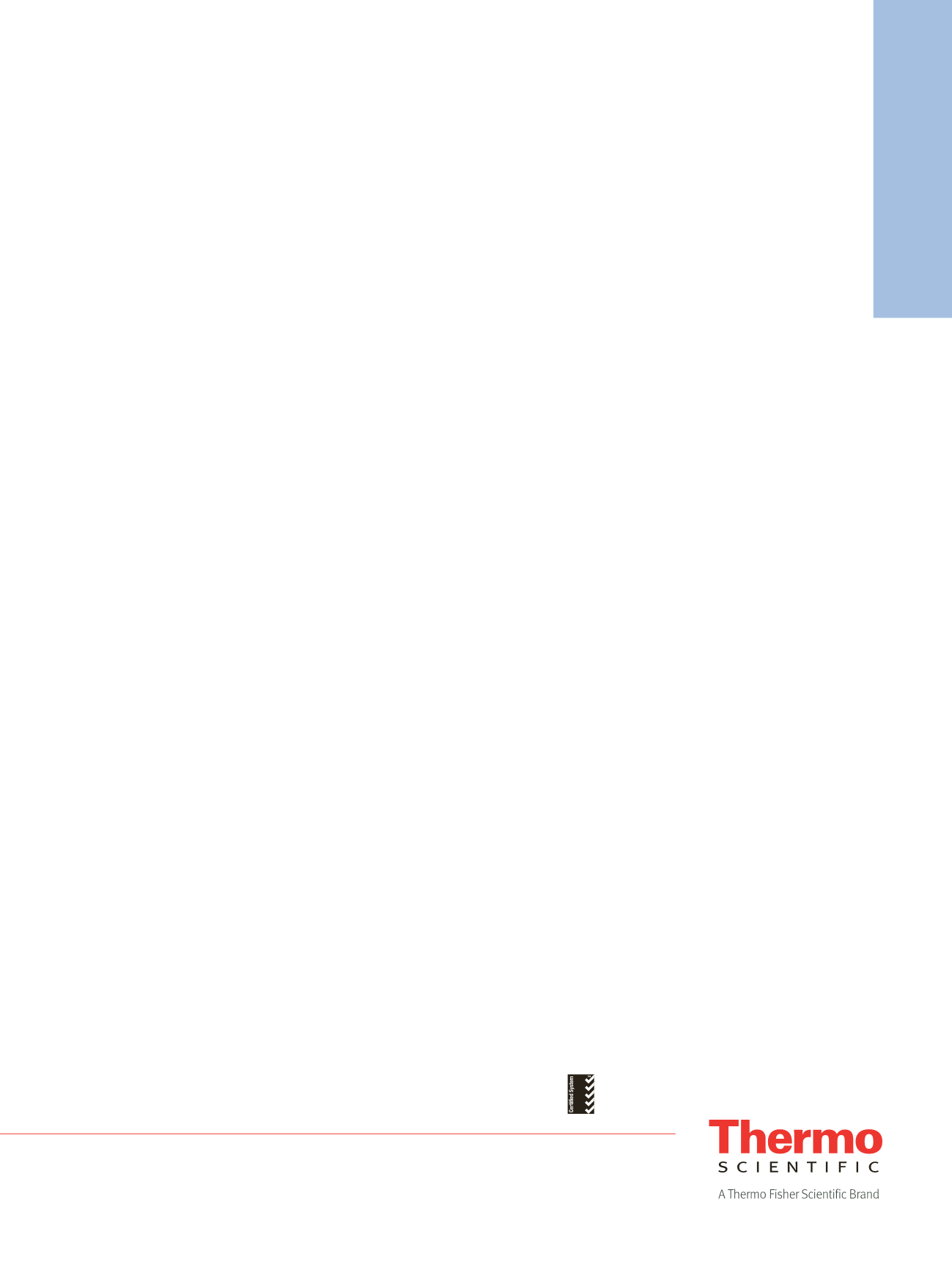

References
1. Krastins, B.; Prakash, A.; Sarracino, D. A.; Nedelkov,
D.; Niederkofler, E. E.; Kiernan, U. A.; Nelson, R.;
Vogelsang, M. S.; Vadali, G.; Garces, A.; Sutton, J. N.;
Petermant, S. M.; Byram, G.; Darbouret, B.; Perusse,
J. R.; Seidah, N. G.; Coulombe, B.; Gobom, J.; Portelius,
E.; Pannee, J.; Blennow, K.; Kulasingam, V.; Couchman,
L.; Moniz, C.; Lopez, M. F. Rapid development of
sensitive, high-throughput, quantitative and highly
selective mass spectrometric targeted immunoassays for
clinically important proteins in human plasma and
serum.
Clinical Biochemistry
2013
, 46
(6), 399-410.
2. Niederkofler, E. E.; Phillips, D. A.; Nedelkov, D.;
Kiernan, U. A.; Krastins, B.; Peterman, S.; Garces, A.;
Lopez, M. F. A universal mass spectrometric
immunoassay (MSIA) model system based on human
insulin-like growth factor 1 (IGF1). In
Application
Notes
, Scientific, T. F., Ed. 2013; Vol. 1001.
3. Oran, P. E.; Jarvis, J.W.; Borges, C.R.; Sherma, N. D.;
Nelson, R. W. Mass spectrometric immunoassay of
intact insulin and related variants for population
proteomcis studies.
Proteomics Clinical Applications
2011
, 5
(7-8), 454-459.
4. Couchman, L.; Taylor, D. R.; Moniz, C. F.; Niederkofler,
E. E.; Ribar, A.; Antwi, K.; Kiernan, U. A.; Krastins, B.;
Peterman, S. MSIA insulin workflow for the
comprehensive identification and analysis of isobaric
insulins: a method for insulin mixture quantitation
using HR/AM and mulitplexed LC. Scientific, T. F., Ed.
2014; Vol. 0614.
5. Peterman, S. M.; Niederkofler, E. E.; Phillips, D. A.;
Krastins, B.; Kiernan, U. A.; Tubbs, K., A.; Nedelkov, D.;
Prakash, A.; Vogelsang, M. S.; Schroeder, T.; Couchman,
L.; Taylor, D. R.; Moniz, C. F.; Vadali, G.; Bryam, G.;
Lopez, M. F. An automated, high-throughput method
for targeted quantification of intact insulin and its
therapeutic analogs in human serum or plasma coupling
mass spectrometric immunoassay with high resolution
and accurate mass detection (MSIA-HR/AM).
Proteomics
2014
, 14
(12), 1445-1456.
For research use only. Not for use in diagnostic procedures.
Conclusion
An automated, high-throughput data processing workflow
for detection and targeted quantification of insulin and its
analogs at low levels in biological matrices was presented
for use in research applications.
Full-scan MS data could be analyzed due to the low noise
and selectivity of the MSIA extraction technology.
Co-eluting insulin analogs were easily separated and
identified based on the accurate
m/z
values of each
precursor charge state and corresponding isotopes.
Detection and quantification ranges were 1.5 to 960 pM
in a plasma matrix. Even at low analyte levels, the
quality of the quantitation was high. Linear regression
values for the method were all better than 0.98 using
a 1/x-weighting scheme. The average dot product
coefficients for the porcine insulin ISTD were consistently
above 0.97 at the 50 pM level. Though the lowest four
levels used in the study were 50–100 times lower than
previously published, %RSD values were acceptably low.
The HRAM data acquisition capabilities of the
Q Exactive mass spectrometer enabled streamlined
qualitative and quantitative data processing and reporting
using Pinpoint software. This approach enabled
quantification of HRAM MS data using the precursor
charge state distribution as well as the isotopic
distribution for evaluation of potential background
interference. By acquiring data in a nontargeted manner,
post-acquisition methods can be used to process the data
later for any insulin variant sequence or modification.
Data processing was performed in 30 minutes using a
single Pinpoint software workbook containing all of the
targeted insulin variants. To achieve robust quantitation,
the Pinpoint software data processing method used the
precursor charge state distribution and isotopic
distribution analysis for evaluation of potential
background interference. Pinpoint software capabilities,
such as color-coding capability and the Main Workbook,
which consolidates qualitative and quantitative tables and
graphs in an interactive display, facilitated data review.
AN64279-EN 1214S
Application Note 619
Africa
+43 1 333 50 34 0
Australia
+61 3 9757 4300
Austria
+43 810 282 206
Belgium
+32 53 73 42 41
Canada
+1 800 530 8447
China
800 810 5118
(free call domestic)
400 650 5118
Denmark
+45 70 23 62 60
Europe-Other
+43 1 333 50 34 0
Finland
+358 9 3291 0200
France
+33 1 60 92 48 00
Germany
+49 6103 408 1014
India
+91 22 6742 9494
Italy
+39 02 950 591
Japan
+81 45 453 9100
Korea
+82 2 3420 8600
Latin America
+1 561 688 8700
Middle East
+43 1 333 50 34 0
Netherlands
+31 76 579 55 55
New Zealand
+64 9 980 6700
Norway
+46 8 556 468 00
Russia/CIS
+43 1 333 50 34 0
Singapore
+65 6289 1190
Spain
+34 914 845 965
Sweden
+46 8 556 468 00
Switzerland
+41 61 716 77 00
UK
+44 1442 233555
USA
+1 800 532 4752
Thermo Fisher Scientific,
San Jose, CA USA is
ISO 13485 Certified.
ISO13485
www.thermoscientific.com©2014 Thermo Fisher Scientific Inc. All rights reserved. Humulin is a registered trademark of Eli Lilly and Co. Apidra and Lantus are
registered trademarks of Sanofi-Aventis U.S. LLC. NovoRapid is a registered trademark of Novo Nordisk A/S. TWEEN is a registered
trademark of Croda International PLC. Sigma-Aldrich is a registered trademark of Sigma-Aldrich Co. LLC. Bachem is a registered
trademark of Bachem Holding AG. ISO is a trademark of the International Standards Organization. All other trademarks are the property
of Thermo Fisher Scientific and its subsidiaries. This information is presented as an example of the capabilities of Thermo Fisher Scientific
products. It is not intended to encourage use of these products in any manners that might infringe the intellectual property rights of others.
Specifications, terms and pricing are subject to change. Not all products are available in all countries. Please consult your local sales
representative for details.



















